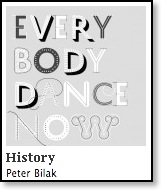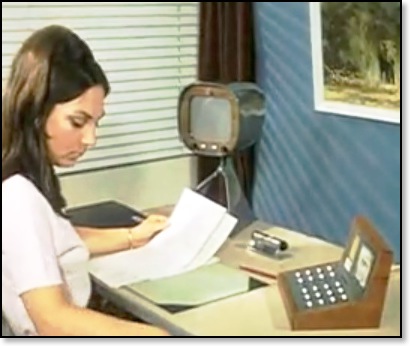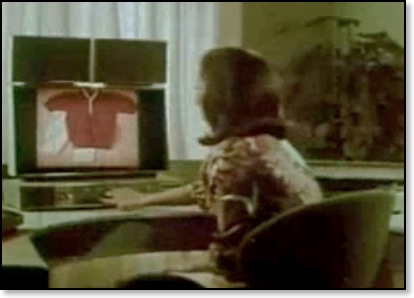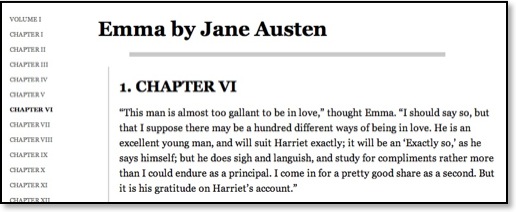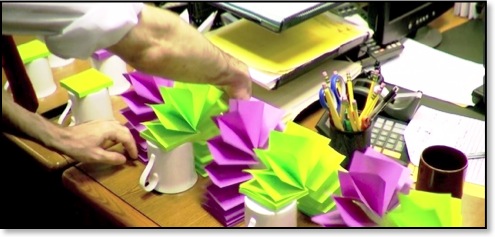Gardening
05/26/09 10:32 Filed in: miscellany

I spent yesterday getting tomatoes and basil and beans put in and generally pothering in the garden. Since we have a serious deer, rabbit, gopher, squirrel and chipmunk problem here (and the squirrels and chipmunks climb the walls of the house and eat stuff on the upper balcony!) we made a pest proof enclosure for the vegetables. Everyone is now settled in, and of course, we had a storm late yesterday that brought the temps down to 55 degrees. Great, for their first night out. Everyone seems to have survived, though.
The rest of the garden has to be rabbit-proof plants. You will notice, though, that all the pansies have been pruned by nibbling teeth, even the ones high up on the wall.
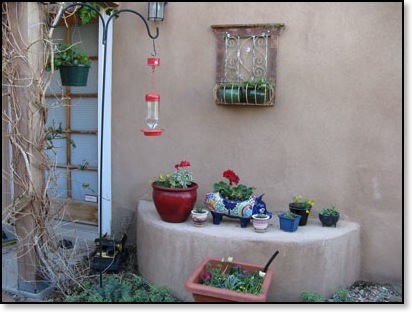
The Kama Sutra is too much for Apple
05/25/09 10:30 Filed in: ebooks
Apple is
blocking a new ereader application for the iPhone on
the basis that it is possible to download the Kama
Sutra from Project Gutenberg, which is
"inappropriate." Shouldn't they block their own
Safari browser?
If you’re wondering why Eucalyptus is not yet available, it’s currently in the state of being ‘rejected’ for distribution on the iPhone App Store. This is due to the fact that it’s possible, after explicitly searching for them, to find, download from the Internet, and then read texts that Apple deems ‘objectionable’. The example they have given me is a Victorian text-only translation of the Kama Sutra of Vatsyayana.
More, including all the Apple official emails, here....
If you’re wondering why Eucalyptus is not yet available, it’s currently in the state of being ‘rejected’ for distribution on the iPhone App Store. This is due to the fact that it’s possible, after explicitly searching for them, to find, download from the Internet, and then read texts that Apple deems ‘objectionable’. The example they have given me is a Victorian text-only translation of the Kama Sutra of Vatsyayana.
More, including all the Apple official emails, here....
On demand publishing is growing by leaps and bounds
05/22/09 10:44 Filed in: publishing
U.S.
book production rose and fell in 2008, according to
preliminary statistics released this morning by
Bowker. The number of new and revised titles produced
by traditional production methods fell 3% in 2008, to
275,232, but the number of on-demand and short run
titles soared 132%, to 285,394. The on-demand and
short run segment is the method typically used by
self-publishers as well as online publishers. With
the decline in the number of traditional books
released last year and the jump in on-demand, the
number of on-demand titles topped those of
traditional books for the first time. Taken together,
total output rose 38%, to 560,626 titles.
More at Publisher's Weekly
More at Publisher's Weekly
Leading women in the American book industry
05/21/09 10:43 Filed in: publishing
Book Business honors the top 50 women shaping the
American book industry. No indexers, sigh.... but
still, good to get a glimpse of these women and their
presses!
Gwenyth Jones, Vice President of Publishing Information Systems and Technologies, John Wiley & Sons
Jones has worked at Wiley for more than 25 years in the professional and trade operation, in roles ranging from publicist to publisher. She now oversees various digital publishing services, including media development, e-business development and Web site management.
Tip: “To navigate a successful journey from print to digital, take a tip from Virginia Woolf and be sure that, as you move through the trough of the waves, you never forget the view from the lighthouse. You must understand both the long view of where your customers are headed, and execute successfully by paying attention to every detail.”
Gwenyth Jones, Vice President of Publishing Information Systems and Technologies, John Wiley & Sons
Jones has worked at Wiley for more than 25 years in the professional and trade operation, in roles ranging from publicist to publisher. She now oversees various digital publishing services, including media development, e-business development and Web site management.
Tip: “To navigate a successful journey from print to digital, take a tip from Virginia Woolf and be sure that, as you move through the trough of the waves, you never forget the view from the lighthouse. You must understand both the long view of where your customers are headed, and execute successfully by paying attention to every detail.”
Future of the Telecom Industry, British edition
05/20/09 10:42 Filed in: silliness
What to do with old index cards?
05/19/09 10:41 Filed in: indexing
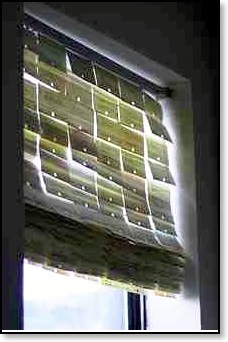
A set of blinds made out of old library catalog cards! Take note, those of you who may still have shoeboxes!
Open source alternatives to Microsoft and other manufacturers' products
05/17/09 10:39 Filed in: miscellany
Before
you pay another cent to Microsoft or another software
publisher,
read this article by Eric Geier to discover
whether you can use a free open source application
instead. Just about every commercial app you use on a
daily basis will have an open source alternative,
whether you use Windows, Mac OS X, or Linux.
Whether you are looking out for your small business or personal computing needs, the open source community delivers robust applications that are completely free. Not only can you typically use these applications on Linux, the open source operating system, but many are also available to run on Windows and Mac OS X. Using these software programs can save you loads of money. You'll soon be on your way to a free and open computing experience.
Whether you are looking out for your small business or personal computing needs, the open source community delivers robust applications that are completely free. Not only can you typically use these applications on Linux, the open source operating system, but many are also available to run on Windows and Mac OS X. Using these software programs can save you loads of money. You'll soon be on your way to a free and open computing experience.
App-noxious? I'm guilty, how about you?
05/16/09 10:38 Filed in: miscellany
With an
app for this and an app for that, iPhones and other
smartphones are now capable of all kinds of amazing
feats. But while our technology has developed by
leaps and bounds, human nature — specifically our
tendency to become obsessed with shiny new toys —
hasn’t changed a whit.
In other words, we’ve officially become “app-noxious.”...
Oh dear, have I become like these people?
“My girlfriend has like eight (screen) pages of apps at this point,” says Clark Manning, a 34-year-old architect from Brooklyn who lists "Pocket Guitar," as well as a mustache app and apps for yoga, Spanish, a light saber and a decibel level meter among her many applications.
“Her iPhone is the last thing that touches her hand before bed and it’s the first thing there in the morning. When the app store first opened, I didn’t talk to her for two weeks without the iPhone between us.”
Manning says he thinks part of the allure is that as a graphic designer, his girlfriend is “enamored with all things Mac.” But he’s starting to think of her downloads as a bit, well, app-hazard.
“She’s got an app that estimates the size of something based on a credit card,” he says. (It’s called “No Ruler.”) “She’s like, ‘This is so cool, it’s like eight credit cards long.’ I’m like, why don’t you just get a tape measure and measure it? It’s this fascination with the technology without thinking, ‘Is this really helping me?’ ”
In other words, we’ve officially become “app-noxious.”...
Oh dear, have I become like these people?
“My girlfriend has like eight (screen) pages of apps at this point,” says Clark Manning, a 34-year-old architect from Brooklyn who lists "Pocket Guitar," as well as a mustache app and apps for yoga, Spanish, a light saber and a decibel level meter among her many applications.
“Her iPhone is the last thing that touches her hand before bed and it’s the first thing there in the morning. When the app store first opened, I didn’t talk to her for two weeks without the iPhone between us.”
Manning says he thinks part of the allure is that as a graphic designer, his girlfriend is “enamored with all things Mac.” But he’s starting to think of her downloads as a bit, well, app-hazard.
“She’s got an app that estimates the size of something based on a credit card,” he says. (It’s called “No Ruler.”) “She’s like, ‘This is so cool, it’s like eight credit cards long.’ I’m like, why don’t you just get a tape measure and measure it? It’s this fascination with the technology without thinking, ‘Is this really helping me?’ ”
Search Engine Conference presentations available online
05/15/09 10:37 Filed in: search
Infonortics has posted PDFs and interviews online
of their recent Boston search engine meetings. Lots
of ideas there, from why today's search engines are
not ready for tomorrow's information needs, to
searching non-text images, voice and video, to
searching with voice interfaces. A lot of technical
information, but worth looking through.
It's really great to make conference material available this way! (Hint hint to all the ASI presenters who haven't posted handouts? See how nice this is to be able to review?)
It's really great to make conference material available this way! (Hint hint to all the ASI presenters who haven't posted handouts? See how nice this is to be able to review?)
Amazon's Kindle and IndieBound top two iPhone apps
Both
book-related! How cool is that! From
GalleyCat:
Less than two weeks after surprise news that Amazon.com, Inc. acquired the company that created the iPhone reader, Stanza, the Apple App Store landscape has shifted. Stanza--the former number one Book app--is now ranked #3 in the free application category, while the American Bookseller Association's indieBound application is #2.
The indieBound iPhone app allows shoppers to find nearby independent bookstores, browse in-print catalogs, and buy from independent bookstores.
I think I need to go check out indieBound!
Less than two weeks after surprise news that Amazon.com, Inc. acquired the company that created the iPhone reader, Stanza, the Apple App Store landscape has shifted. Stanza--the former number one Book app--is now ranked #3 in the free application category, while the American Bookseller Association's indieBound application is #2.
The indieBound iPhone app allows shoppers to find nearby independent bookstores, browse in-print catalogs, and buy from independent bookstores.
I think I need to go check out indieBound!
Everything Twitter
05/13/09 10:35 Filed in: miscellany
Seriously,
everything you need to know to get started...All
You Need To Know About Twitter
And why? Well, that's more complex. It can be a terrific time waster. Or it can be a way to develop relationships. Only you can say if it is worth the time to you. But, what if editors and publishers were on there (which they are) and you could read about their thoughts? I have yet to see one announce a nice new book ready for an indexer, but it is one way into communication that is easier than cold calling.
And why? Well, that's more complex. It can be a terrific time waster. Or it can be a way to develop relationships. Only you can say if it is worth the time to you. But, what if editors and publishers were on there (which they are) and you could read about their thoughts? I have yet to see one announce a nice new book ready for an indexer, but it is one way into communication that is easier than cold calling.
Emma in a new ebook reader format
05/12/09 10:34 Filed in: ebooks
Steven Johnson on digital reading, and self indexing
With
books becoming part of this universe, "booklogs" will
prosper, with readers taking inspiring or infuriating
passages out of books and commenting on them in
public. Google will begin indexing and ranking
individual pages and paragraphs from books based on
the online chatter about them. (As the writer and
futurist Kevin Kelly says, "In the new world of
books, every bit informs another; every page reads
all the other pages.") You'll read a puzzling passage
from a novel and then instantly browse through dozens
of comments from readers around the world,
annotating, explaining or debating the passage's true
meaning.
Think of it as a permanent, global book club. As you read, you will know that at any given moment, a conversation is available about the paragraph or even sentence you are reading. Nobody will read alone anymore. Reading books will go from being a fundamentally private activity -- a direct exchange between author and reader -- to a community event, with every isolated paragraph the launching pad for a conversation with strangers around the world.
This great flowering of annotating and indexing will alter the way we discover books, too. Web publishers have long recognized that "front doors" matter much less in the Google age, as visitors come directly to individual articles through search. Increasingly, readers will stumble across books through a particularly well-linked quote on page 157, instead of an interesting cover on display at the bookstore, or a review in the local paper.
Imagine every page of every book individually competing with every page of every other book that has ever been written, each of them commented on and indexed and ranked. The unity of the book will disperse into a multitude of pages and paragraphs vying for Google's attention.
Full article here -- great thoughtful stuff!
Think of it as a permanent, global book club. As you read, you will know that at any given moment, a conversation is available about the paragraph or even sentence you are reading. Nobody will read alone anymore. Reading books will go from being a fundamentally private activity -- a direct exchange between author and reader -- to a community event, with every isolated paragraph the launching pad for a conversation with strangers around the world.
This great flowering of annotating and indexing will alter the way we discover books, too. Web publishers have long recognized that "front doors" matter much less in the Google age, as visitors come directly to individual articles through search. Increasingly, readers will stumble across books through a particularly well-linked quote on page 157, instead of an interesting cover on display at the bookstore, or a review in the local paper.
Imagine every page of every book individually competing with every page of every other book that has ever been written, each of them commented on and indexed and ranked. The unity of the book will disperse into a multitude of pages and paragraphs vying for Google's attention.
Full article here -- great thoughtful stuff!
Wolfram Alpha - new challenge to Google
05/08/09 10:31 Filed in: search
Evidently
in certain arenas of knowledge, yes. Across the
board, no.
Wolfram Alpha is like a cross between a research library, a graphing calculator, and a search engine. But does Wolfram Research's "computational knowledge engine," set to debut publicly later this month, live up to its hype as a Web site that Google needs to be afraid of?
Wolfram Alpha is like a cross between a research library, a graphing calculator, and a search engine. But does Wolfram Research's "computational knowledge engine," set to debut publicly later this month, live up to its hype as a Web site that Google needs to be afraid of?
McSweeney's new faux course on writing for nonreaders
05/04/09 10:30 Filed in: silliness
McSweeneys
is an eccentric publisher of books -- each volume of
the McSweeneys Reader has a theme. I have their
comics volume, which is just a wonderful collection
of history, style, new artists, old artists, and
included two add in booklets. Their website is just
as much fun (or not, at times they can be bleakly
humorous), as you can see by their latest
essay:
ENG 371WR:
Writing for Nonreaders in the Postprint Era
M-W-F: 11:00 a.m.–12:15 p.m.
Instructor: Robert Lanham
Course Description
As print takes its place alongside smoke signals, cuneiform, and hollering, there has emerged a new literary age, one in which writers no longer need to feel encumbered by the paper cuts, reading, and excessive use of words traditionally associated with the writing trade. Writing for Nonreaders in the Postprint Era focuses on the creation of short-form prose that is not intended to be reproduced on pulp fibers.
Instant messaging. Twittering. Facebook updates. These 21st-century literary genres are defining a new "Lost Generation" of minimalists who would much rather watch Lost on their iPhones than toil over long-winded articles and short stories. Students will acquire the tools needed to make their tweets glimmer with a complete lack of forethought, their Facebook updates ring with self-importance, and their blog entries shimmer with literary pithiness. All without the restraints of writing in complete sentences. w00t! w00t! Throughout the course, a further paring down of the Hemingway/Stein school of minimalism will be emphasized, limiting the superfluous use of nouns, verbs, adverbs, adjectives, conjunctions, gerunds, and other literary pitfalls.
Prerequisites
Students must have completed at least two of the following.
ENG: 232WR—Advanced Tweeting: The Elements of Droll
LIT: 223—Early-21st-Century Literature: 140 Characters or Less
ENG: 102—Staring Blankly at Handheld Devices While Others Are Talking
ENG: 301—Advanced Blog and Book Skimming
ENG: 231WR—Facebook Wall Alliteration and Assonance
LIT: 202—The Literary Merits of Lolcats
LIT: 209—Internet-Age Surrealistic Narcissism and Self-Absorption
I think I've taken Lit 202 and Eng 102, but I have to make up 209 before I can take this... And afterwards, we can put together a session on indexing for nonsearchers in the postprint era.
ENG 371WR:
Writing for Nonreaders in the Postprint Era
M-W-F: 11:00 a.m.–12:15 p.m.
Instructor: Robert Lanham
Course Description
As print takes its place alongside smoke signals, cuneiform, and hollering, there has emerged a new literary age, one in which writers no longer need to feel encumbered by the paper cuts, reading, and excessive use of words traditionally associated with the writing trade. Writing for Nonreaders in the Postprint Era focuses on the creation of short-form prose that is not intended to be reproduced on pulp fibers.
Instant messaging. Twittering. Facebook updates. These 21st-century literary genres are defining a new "Lost Generation" of minimalists who would much rather watch Lost on their iPhones than toil over long-winded articles and short stories. Students will acquire the tools needed to make their tweets glimmer with a complete lack of forethought, their Facebook updates ring with self-importance, and their blog entries shimmer with literary pithiness. All without the restraints of writing in complete sentences. w00t! w00t! Throughout the course, a further paring down of the Hemingway/Stein school of minimalism will be emphasized, limiting the superfluous use of nouns, verbs, adverbs, adjectives, conjunctions, gerunds, and other literary pitfalls.
Prerequisites
Students must have completed at least two of the following.
ENG: 232WR—Advanced Tweeting: The Elements of Droll
LIT: 223—Early-21st-Century Literature: 140 Characters or Less
ENG: 102—Staring Blankly at Handheld Devices While Others Are Talking
ENG: 301—Advanced Blog and Book Skimming
ENG: 231WR—Facebook Wall Alliteration and Assonance
LIT: 202—The Literary Merits of Lolcats
LIT: 209—Internet-Age Surrealistic Narcissism and Self-Absorption
I think I've taken Lit 202 and Eng 102, but I have to make up 209 before I can take this... And afterwards, we can put together a session on indexing for nonsearchers in the postprint era.
Espresso Book machine on-demand printing
05/03/09 10:28 Filed in: publishing
Publishers Weekly reports that:
Lightning Source has launched an Espresso Book Machine pilot program, done in conjunction with On Demand Books, through which select publishers will be able to offer their customers the opportunity to print their titles on the Espresso machines located in bookstores.
The pilot program expands on Lightning's previously announced partnership with On Demand Books, the company that makes the EBM, a device that works like a copier for books, printing and binding them in a few minutes.
Publishers participating in the pilot, culled from among Lightning's clients, include Simon & Schuster, John Wiley & Sons, Hachette Book Group, McGraw-Hill, Macmillan, University of California Press and Norton. Through the program some 85,000 titles will be available at EBM locations across the country, starting next month.
According to On Demand Books, there are currently five Espresso machines in the U.S. (with 10 others in locations throughout Canada and the U.K.). This, though, will soon change. Dane Neller, CEO of On Demand, said that "within a relatively short period that number will be increasing dramatically." On Demand is releasing a new model of the machine, version 2.0, which will print books faster--roughly four minutes for a 300-page book as opposed to eight minutes--and be offered at a lower price point. Neller added that the Espresso machine can now be leased as well. The 2.0 model will be on display at the London Book Fair.
Lightning Source has launched an Espresso Book Machine pilot program, done in conjunction with On Demand Books, through which select publishers will be able to offer their customers the opportunity to print their titles on the Espresso machines located in bookstores.
The pilot program expands on Lightning's previously announced partnership with On Demand Books, the company that makes the EBM, a device that works like a copier for books, printing and binding them in a few minutes.
Publishers participating in the pilot, culled from among Lightning's clients, include Simon & Schuster, John Wiley & Sons, Hachette Book Group, McGraw-Hill, Macmillan, University of California Press and Norton. Through the program some 85,000 titles will be available at EBM locations across the country, starting next month.
According to On Demand Books, there are currently five Espresso machines in the U.S. (with 10 others in locations throughout Canada and the U.K.). This, though, will soon change. Dane Neller, CEO of On Demand, said that "within a relatively short period that number will be increasing dramatically." On Demand is releasing a new model of the machine, version 2.0, which will print books faster--roughly four minutes for a 300-page book as opposed to eight minutes--and be offered at a lower price point. Neller added that the Espresso machine can now be leased as well. The 2.0 model will be on display at the London Book Fair.
